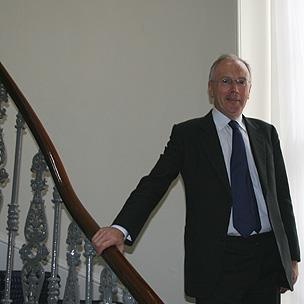On the road with the Silk Commission
- Published
- comments
What's a girl to do on a Wednesday afternoon in Abertillery? A haircut at Scissorz? A visit to Conqueror Tattoos? Or perhaps a chat about the future of devolution?
You'll be glad to hear (particularly on the tattoo front I suspect) that yesterday I opted for the last of those. It was day two of the Silk Commission's tour of Wales and on behalf of the viewers of Wales Today, I was there.

Commission chairman Paul Silk
The Commission, led by Paul Silk, is by now well into the second part of its job, considering how the devolution settlement can be improved.
And that's why it was hosting a drop in session at the Met Conference and Cultural Centre in Abertillery yesterday afternoon as part of a five week long nationwide tour, external - to find out what people there made of the current devolution settlement.
Perhaps there was a run on at the hairdresser or the tattoo parlour after I'd walked past, but the people of Abertillery didn't exactly flock to the Met - in fact just five of them made it during the afternoon. Yes, five. But for the select few? It worked. They'd listened a bit then talked quite a lot. They'd discussed the further devolution of water, nuclear power planning consents, and wondered whether the event couldn't have been better advertised. One of the five lived a hundred yards away and had only dropped by because he'd spotted some movement. Why didn't they tell us it was happening, he asked? A case of damned if you pay for expensive ads, damned if you don't, I suspect.
As his staff packed up around him for the trip to the evening meeting in Monmouth, Paul Silk was staying positive. Ok, there were lots of empty chairs and coffee cups and the biscuits were uneaten, but he hadn't yet held a session, he said, where he hadn't learned something.
And so on to the Shire Hall in Monmouth, Henry V - as ever - outside, and around 20 people inside who were up for a bit of a fight, that gradually turned into a discussion, one that raised quite a few tough questions.
One of the issues for the commissioners is that they're tasked with producing a report into whether there should be further devolution to Wales in areas like energy, policing, criminal justice and broadcasting, among others. This isn't meant to be based on the record of devolution thus far, but merely about the merits, or otherwise, of devolving more from Westminster to Cardiff.
Hang on, said some of those present. It says 'evidence' on your slide. Well the only evidence we have is how the Welsh Government has performed so far. We don't really know whether broadcasting would be better or more efficiently regulated by the Welsh Government rather than the UK Government. What we do know is that we're not particularly pleased with Cardiff Bay's record on health and education which they've run since 1999. Shouldn't they show they can deliver on what they have now?
That's as maybe, or maybe not, said the scrupulously neutral Commissioners chairing the session. But those at the meeting certainly knew who was accountable for what. The general tenor of the meeting was against devolution of policing, scepticism on Wales having powers over criminal justice but interestingly, when they got on to areas like energy, where responsibilities are split, many said - for goodness sake, if Wales is going to have some of the powers, we might as well have them all.
Then it was on to the fruit cake and a general rueing of the fact that so few had bothered to turn up. Funny that. I spent this morning listening to an audience in Cardiff Bay rueing the fact that so few London-based papers and programmes bother to pay the Assembly much attention. The panellists, London-based obviously, refused to join in the "counsel of despair" as Kevin Maguire, associate editor of the Mirror put it. He'd done his homework. He'd watched First Minister's Questions and found it "boring as hell - I'm amazed anyone watches it".
The man in charge of BBC Parliament was too polite to agree, yet inside, you sensed Peter Knowles was nodding vigorously. When AMs "type and fiddle" at their computers during debates, "you wonder if they're in the space. So how do they expect the audience to be there in that space?" For what it's worth, I sense most of the audience had started to nod vigorously by that point.
The message overall? London based papers cover British politics. Assembly politics has to fight its way in.
Tonight - I'm back on the Silk road and heading off to Pontypridd. They may be fighting their way into Gartholwg Community Campus, they may not - but they'll be in the space, ready to listen.